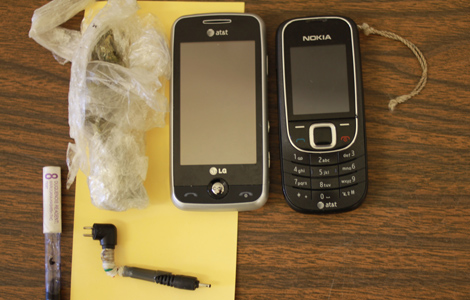 Smuggled cell phone detection by a dog at Riker’s Island prison is the topic of this article. The article states that smuggled cellphones haven’t been as big a problem in New York as they’ve been in other areas. The reason is the generous policy on the use of land lines.
Smuggled cell phone detection by a dog at Riker’s Island prison is the topic of this article. The article states that smuggled cellphones haven’t been as big a problem in New York as they’ve been in other areas. The reason is the generous policy on the use of land lines.
“New York state facilities charge inmates less for phone use and offer greater access than other states, said state prison spokesman Peter Cutler. That cuts the demand for the phones for all but hardened criminals, because those who just want to keep in touch with friends, families and lawyers can do so.”
This is another validation of our position that the problem of contraband cell phones in prison is an issue of supply AND demand. By addressing the demand for greater access to telecommunications services by deploying the meshDETECT secure prison cell phone service, prisons and jails can reduce the number of smuggled cell phones entering their facilities.
A new member of the patrol force at Rikers Island is poised to take a megabyte out of crime.
A dog trained to sniff out cellphones will soon be roaming the prison’s corridors searching for mobile devices, which are forbidden to inmates.
Inmates love cellphones because prison official monitor land-line calls — while cellphones can be used in the privacy of cells.
Prisoners have been known to use them to set up drug deals, threaten witnesses, keep running their organizations and even coordinate escape attempts.
Dogs love cellphones because they are a delight to their noses.
The dogs are trained to zero in on the lithium batteries, but they have also proven adept at locating other parts of the phones, including chargers and earpieces.
The dogs typically cost $6,000 and are on the job in several other states.
Cellphones pose a “serious risk to staff and inmates,” said Sharman Stein, a spokeswoman for the city Department of Correction.
She declined to provide details about the dogs or their training — refusing even to disclose the name of the new recruit. She cited “security reasons.’’
Authorities said, however, that the canine will join the department’s team of drug-sniffing pooches.
So far, smuggled cellphones haven’t been as big a problem in New York as they’ve been in other areas.
In city prisons, 31 cellphones were confiscated as of mid-October this year, 37 in 2010 and 14 in 2009, according to the Department of Correction.
In New York state-operated facilities, 85 phones were confiscated in 2010.
Not all of them were taken from prisoners — many were found on staff or visitors, who are not allowed to bring them past the front door.
Another reason the problem is not as severe in the city and state systems is their generous policy on the use of land lines.
New York state facilities charge inmates less for phone use and offer greater access than other states, said state prison spokesman Peter Cutler.
That cuts the demand for the phones for all but hardened criminals, because those who just want to keep in touch with friends, families and lawyers can do so.
- Blockchain System for Compliant Inmate Transactions - March 4, 2025
- Securus Gets the Signal, Eleven Years Later - August 23, 2024
- Multi-Blockchain System for Inmate Forensics - April 2, 2024




